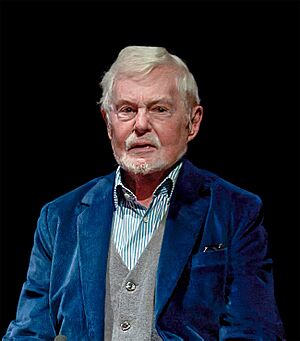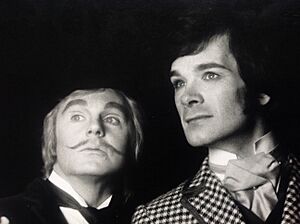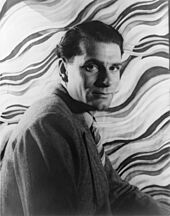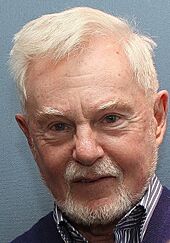Derek Jacobi facts for kids
Quick facts for kids
Sir
Derek Jacobi
|
|
|---|---|

Jacobi in 2022
|
|
| Born | 22 October 1938 Leytonstone, Essex, England
|
| Alma mater | St John's College, Cambridge |
| Occupation | Actor |
| Years active | 1959–present |
|
Works
|
Full list |
| Partner(s) | Richard Clifford (1979–present) |
| Awards | Full list |
Sir Derek George Jacobi is a famous English actor. He was born on October 22, 1938. He is well-known for his many roles on stage and in movies and TV shows. He has won many awards, including a Tony Award, a BAFTA Award, and two Primetime Emmy Awards. In 1994, Queen Elizabeth II made him a "Sir" (a Knight Bachelor) for his great work in theatre.
Derek Jacobi began his acting career with Laurence Olivier at the new Royal National Theatre. He has acted in many plays by William Shakespeare, such as Hamlet and Much Ado About Nothing. He won a Laurence Olivier Award for his role in Cyrano de Bergerac in 1983. He also won a Tony Award for Best Actor in a Play for his part in Much Ado About Nothing in 1985.
On television, he played Claudius in the BBC series I, Claudius (1976). This role helped him become very famous. He also appeared in the TV show Cadfael (1994–1998) and the sitcom Vicious (2013-2016). He has been in many films, including Henry V (1989) and Gladiator (2000).
Contents
Early Life and Learning
Derek George Jacobi was born in Leytonstone, England. His father ran a sweet shop, and his mother was a secretary. He was an only child and had a happy childhood.
School Days and First Plays
As a teenager, he went to Leyton County High School for Boys. He loved the drama club there. He even starred in a play called Hamlet, which was performed at a festival in Scotland.
When he was 18, he won a scholarship to University of Cambridge. He studied history there. At Cambridge, he acted in many plays, including Hamlet again. After he finished university in 1960, he was invited to join the Birmingham Repertory Theatre.
Acting Career Highlights
Derek Jacobi's career has been long and successful, with many memorable roles.
Starting Out on Stage
A famous actor named Laurence Olivier saw Derek Jacobi's talent. He invited Jacobi to be one of the first actors in the new Royal National Theatre in London. In 1963, Jacobi played Laertes in the theatre's first show, Hamlet. He also played Cassio in the theatre's play Othello, and later in the 1965 movie version.
After eight years, Jacobi left the National Theatre in 1971 to try different kinds of roles. In the 1970s, he often worked with a touring theatre group. He played many roles with them, traveling around.
Becoming a Star
Jacobi became very famous in 1976 when he played the main character in the BBC series I, Claudius. He was praised for his amazing performance as the Roman Emperor Claudius.
In 1979, he took his play Hamlet on a world tour. He performed it in many countries, including Egypt, Japan, and China. He even performed it at Kronborg Castle in Denmark, which is known as Elsinore Castle in the play.
Big Roles in the 1980s and 1990s

In the 1980s, Jacobi joined the Royal Shakespeare Company. He played several challenging roles at the same time. He won a Tony Award for his role as Benedick in Much Ado About Nothing on Broadway. He also played Prospero in The Tempest and Cyrano in Cyrano de Bergerac.
In 1986, he starred in the play Breaking the Code, where he played Alan Turing, a famous mathematician. This play was written especially for Jacobi. He also appeared in TV dramas like The Tenth Man (1988).
In the 1990s, Jacobi continued to act in Shakespeare plays. He also directed a touring production of Hamlet. He starred in the TV series Cadfael (1994–1998), where he played a monk who solves mysteries. He also appeared in films like Henry V (1989) and Gladiator (2000).
Recent Work and Narrations
Since 2000, Derek Jacobi has continued to be very busy. He has narrated many audiobooks, including The Voyage of the Dawn Treader by C. S. Lewis. In 2001, he won an Primetime Emmy Award for Outstanding Guest Actor in a Comedy Series for his funny role in the TV show Frasier.
He also narrated the BBC children's series In the Night Garden..., which started in 2007. In 2007, he appeared in the Doctor Who episode "Utopia", playing a character who turns out to be the Master. He had always wanted to be in Doctor Who.
In 2010, he starred in a play called King Lear in London, which was highly praised. From 2012 to 2020, he starred in the BBC series Last Tango in Halifax. From 2013 to 2016, he also starred with Ian McKellen in the sitcom Vicious.
More recently, in 2019, he played Emperor Claudius again in Horrible Histories: The Movie – Rotten Romans. In 2022, he appeared in the film Allelujah.
Personal Life
Derek Jacobi is an agnostic, meaning he is unsure about the existence of God.
Family Life
In 2006, Derek Jacobi registered his civil partnership with Richard Clifford. Richard Clifford is a theatre director. They have been together since the late 1970s. They live in London.
Interests and Beliefs
Derek Jacobi is interested in the question of who really wrote Shakespeare's plays. He supports the idea that Edward de Vere, 17th Earl of Oxford might have written them instead of William Shakespeare. In 2007, he and another actor, Mark Rylance, started a "Declaration of Reasonable Doubt" to encourage more research into this question.
In 2011, Jacobi was in a film called Anonymous, which was about this theory. He narrated the beginning and end of the film.
Awards and Honors
Derek Jacobi has received many awards for his acting. These include:
- Two Laurence Olivier Awards
- A Tony Award
- A BAFTA Award
- Two Primetime Emmy Awards
- Two Screen Actors Guild Awards
He has also received special honors:
- 1985: Commander of the Order of the British Empire (from the United Kingdom)
- 1989: Knight 1st class of the Order of the Dannebrog (from Denmark)
- 1994: Knight Bachelor, for his contributions to Drama (from the United Kingdom)
See also
 In Spanish: Derek Jacobi para niños
In Spanish: Derek Jacobi para niños
- List of British actors




